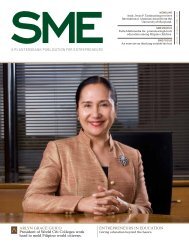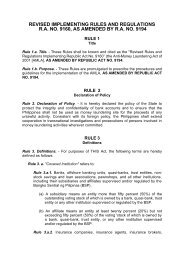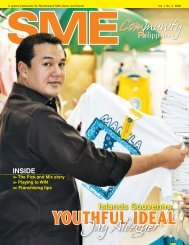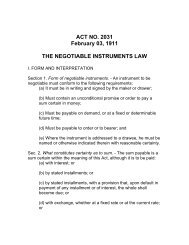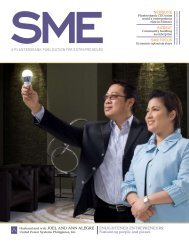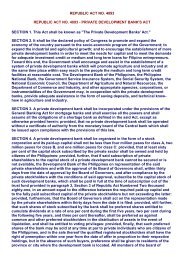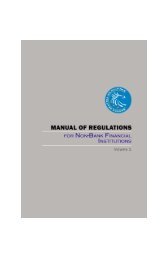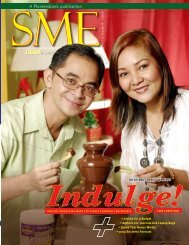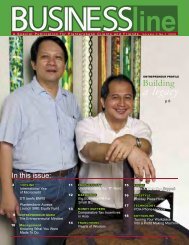NEWSLINE BIZBEAT SME PROFILE DeNNIs ChAN LeADeRs IN ...
NEWSLINE BIZBEAT SME PROFILE DeNNIs ChAN LeADeRs IN ...
NEWSLINE BIZBEAT SME PROFILE DeNNIs ChAN LeADeRs IN ...
Create successful ePaper yourself
Turn your PDF publications into a flip-book with our unique Google optimized e-Paper software.
Randell Tiongson is an advocate of Life & Personal<br />
Finance. He is a Director of the Registered Financial<br />
Planner Institute (Phils.) and has over 20 years<br />
experience in the financial services industry.<br />
For questions, write to randell@randelltiongson.<br />
com. To read his personal finance blogs, visit<br />
http://www.randelltiongson.com/.<br />
sme focus<br />
wealth management<br />
Gearing Up for an Emergency<br />
Here’s one of the most fundamental objectives one should prioritize -<br />
setting up an emergency fund.<br />
by r a n d e l l t i o n g s o n<br />
It is foolish to think that we will<br />
never undergo an emergency in life<br />
and most of the time emergencies<br />
cost a lot of money. In my seminar<br />
Steps to Financial Peace, I talked<br />
about setting up an emergency<br />
fund as the 3rd step to achieving<br />
financial security.<br />
Before starting an emergency<br />
fund, it is best if you know how<br />
much you actually spend in a<br />
month. Many people I know are<br />
clueless as to how much they spend<br />
monthly.<br />
If you already have a monthly<br />
figure, you are now ready to start<br />
building your emergency fund.<br />
The rule of thumb for emergency<br />
allocation is somewhere between<br />
3 to 6 months of your monthly<br />
expenses. 3 months is good, 4<br />
months is better, 5 months will be<br />
great and 6 months is excellent.<br />
Emergency funds come in handy<br />
for a variety of reasons: medical<br />
emergencies, loss of employment<br />
and so forth. You should also be<br />
sensible in determining what an<br />
emergency is and what it is not. A<br />
42” flat LED TV that is on Sale is<br />
definitely not an emergency.<br />
Here are 3 good reasons Why should you<br />
set up an emergency fund? :<br />
1) Emergencies do happen: It is<br />
foolish to think that emergencies<br />
will not happen to you. Things<br />
do come up that you have not<br />
planned for and you’re going to<br />
have to provide for them.<br />
2) Relieves stress: Having an<br />
emergency fund has an added<br />
bonus — peace of mind! You<br />
will feel relieved because you<br />
no longer have to worry about<br />
most small emergencies. Once<br />
you get your larger emergency<br />
fund saved, you won’t have to<br />
worry about paying for most<br />
large ones either.<br />
3) Risk reduction: You are less<br />
likely to go into debt because<br />
you are able to plan ahead.<br />
Starting an emergency fund<br />
is not easy but this is definitely<br />
something we should prioritize.<br />
Dave Ramsey suggests we do it by<br />
‘baby steps’. Do it in stages like 1<br />
week worth of expenses first, and<br />
then move to 2 weeks, to 3 weeks<br />
and so forth. Keep a piggy bank or<br />
an envelope where you can place<br />
your emergency fund. My wife and<br />
I have this big transparent piggy<br />
bank. Once the amount reaches<br />
P3,000 to P5,000, we transfer it to<br />
our savings account/emergency<br />
fund. We take baby steps too.<br />
Here are some tips:<br />
1) Keep your emergency fund in<br />
cash or near cash placements<br />
like savings, current, time<br />
deposits or Special Deposit<br />
Accounts (SDA). Do not invest<br />
your emergency funds yet<br />
as those are intended to be<br />
a buffer or a margin for your<br />
finances. Make sure that the<br />
deposits can be withdrawn<br />
quickly and without huge<br />
penalties.<br />
2) Keep some of those funds in<br />
an ATM account, say 2 weeks’<br />
worth. Emergencies do not<br />
necessarily occur during<br />
banking hours.<br />
3) Once you have achieved an<br />
ideal 6 months emergency<br />
buffer, start investing in better<br />
yielding instruments like<br />
marked to market funds (UITF,<br />
Mutual Funds) because said<br />
instruments should perform<br />
better in the long run. If you<br />
keep all your money in low<br />
yielding deposits, its value will<br />
ultimately erode because of<br />
inflation.<br />
Gear up for an emergency<br />
because it is the wise thing to do.<br />
© Armaggesin | Dreamstime.com<br />
13



